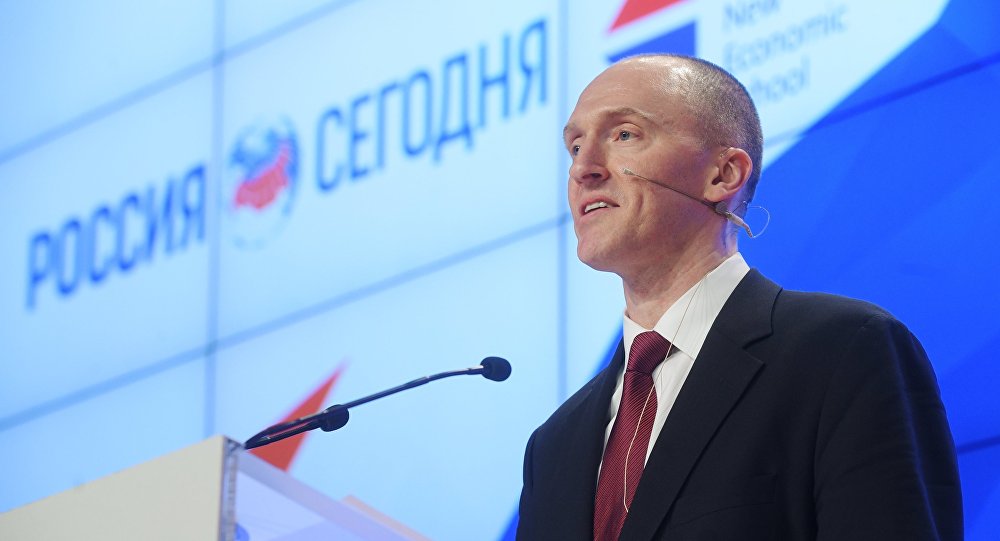
The FBI on Saturday night released the surveillance records from the wiretap on Carter Page, a onetime Trump campaign aide whose surveillance by the FBI was at the center of a declassified Republican memo released in February by House Intelligence Committee Republicans. The documents released were once classified as top secret.
The materials include an October 2016 application to the Foreign Intelligence Surveillance Court to wiretap Page as well as several renewal applications, The New York Times reported. It is highly unusual for documents related to FISA wiretap applications to be released.
While the documents were heavily redacted in places, the Times reported that visible portions of the documents show the FBI telling the intelligence court that Page "has been collaborating and conspiring with the Russian government." The agency also told the court that "the FBI believes Page has been the subject of targeted recruitment by the Russian government."
Page has denied being a Russian agent.
After a redaction, the Times reported that the application to wiretap Page included a partial sentence: "... undermine and influence the outcome of the 2016 U.S. presidential election in violation of U.S. criminal law."
The surveillance of Page became a contentious matter between Republican and Democratic lawmakers earlier this year. Republicans alleged the FBI had abused its surveillance powers and improperly obtained the warrant, a charge that Democrats rebutted as both sides characterized the documents in different ways. The documents, meanwhile, remained out of public view.
Page was a little known investment banker when Mr. Trump announced him as a member of his foreign policy advisory team early last year. Mr. Trump's aides insist the president has no relationship with Page and did not have any dealings with him during the campaign.
His relationship with Russia began to draw scrutiny during the campaign after he visited Moscow in July 2016 for a speech at the New Economic School. While Page said he was traveling in a personal capacity, the school cited his role in the Trump campaign in advertising the speech.
Page was sharply critical of the U.S. in his remarks, saying Washington has a "hypocritical focus on ideas such as democratization, inequality, corruption and regime change." During this visit, Page was suspected of meeting with Russian officials, and later, in October 2016, the FBI and Justice Department sought and were granted the power to electronically wiretap Page.
Days later, Page talked with Russia's ambassador to the U.S. at an event on the sidelines of the Republican National Convention. Attorney General Jeff Sessions spoke with the Russian envoy at the same event, a conversation he failed to reveal when asked about contacts with Russians during his Senate confirmation hearings.
The campaign began distancing itself from Page after his trip to Russia, saying he was only an informal adviser. By the fall, he appeared to have cut ties to the Republican campaign.
It's unclear how Page got connected with the Trump campaign. One campaign official said Page was recruited by Sam Clovis, an Iowa Republican operative who ran the Trump campaign's policy shop and is now a senior adviser at the Agriculture Department. Those who served on the campaign's foreign policy advisory committee also said they had limited contact with Page.
But in a letter Page sent to the Senate intelligence committee in March 2017, he cast himself as a regular presence in Trump Tower, where the campaign was headquartered.
"I have frequently dined in Trump Grill, had lunch in Trump Café, had coffee meetings in the Starbucks at Trump Tower, attended events and spent many hours in campaign headquarters on the fifth floor last year," Page wrote. He also noted that his office building in New York "is literally connected to the Trump Tower building by an atrium."
Page, a former Merrill Lynch investment banker who worked out of its Moscow office for three years, now runs Global Energy Capital, a firm focused on energy sectors in emerging markets. According to the company's website, he has advised on transactions for Gazprom and RAO UES, a pair of Russian entities.His interest in Russia came about when he studied in Moscow while he was a Navy midshipman in the early 1990s, and later in his career, he also worked in Russia for a few years. Media stories have pointed out that Page is the sole employee of his firm, and a New York Times Magazine profile of Page said that his company's headquarters were a windowless "corporate co-working space" that he rents by the hour.
Page also briefly worked for the Eurasia Group. The president of the Eurasia Group, Ian Bremmer, memorably tweeted about Page in April 2017, calling him "the most wackadoodle @EurasiaGroup alumn in history. #SoFar."
Soure: CBS News





